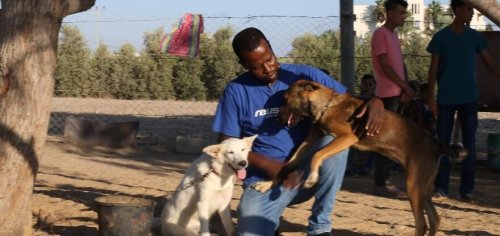Animal Shelters Vs. Foster Families: What's the Difference?

There are many different names to describe places that take in lost or stray pets. Dog pounds, animal shelters, rescue centers… But are they all the same? And if not, what’s the difference?
While many people believe that these terms all refer to the same thing, this isn’t actually the case. Each one plays a very different role. Whether you go to one or another will depend on what you need.
What are dog pounds and what are they for?

Dog pounds are organizations which are usually set up by local governments or city councils, with the aim of rounding up stray animals. Every town and city has its own group to take care of lost and stray pets. Usually, their owners have a minimum of twenty days to collect them, depending on local law.
It’s important to mention that pounds are not charities. They’re businesses, and local councils pay them to do the “dirty work”.
How do pounds work?
The first thing that happens when an animal arrives at the pound is that they check it for a microchip and try to contact the owners. If the pet has gotten lost or been stolen, the owners usually come to collect them within a few hours. If they don’t, it might be that the animal has been abandoned. Sadly, if nobody claims or adopts the dog within 21 days, pounds are authorized to euthanize them.
What are animal shelters and what do they do?
The first thing we should mention is that animal shelters are charity organizations, run by volunteers. They take care of all animals, completely free of charge.
Animal shelters never euthanize healthy animals. They only do so if the animal is suffering from a terminal illness, or in extreme pain. They only resort to euthanasia when there are no other options.
Volunteers work in animal shelters, usually working for free. They devote their time to saving animals abandoned in the street.
They also try to take as many dogs as they can from pounds, saving those that would otherwise be euthanized. If they don’t have enough space to take them, they contact rescue centers in other cities to try to arrange to move them there instead. Plus, they also use social media to promote adoption, posting photos and videos of rescued animals.
These associations take care of the animals, giving them food, water, veterinary attention, and anything else they need. They gratefully accept donations from fellow animal lovers. The living conditions they provide all the animals in their care with are very different from those you’ll find in pounds.
Animal shelters and foster homes

Foster families take in abused or abandoned animals, and almost always work alongside rescue centers.
When a rescue center doesn’t have space for any more animals, foster families agree to welcome them into their home for a short time. They need to be able to provide suitable accommodation for two or more animals on a temporary basis.
When people come to the rescue center looking to adopt an animal, they often send them straight to the foster homes. These animals get top priority when there’s a new home up for grabs.
If you want to foster an animal, it’s really easy to do. All you need to do is look after a dog or cat for a while, until they can find a permanent home. This might also be a good chance for you to work out whether you want a pet of your own. Who knows, maybe you won’t want to ever give them back…
In conclusion, pounds are businesses, while foster homes and rescue centers help abandoned and mistreated animals. However, while rescue centers need a proper license to function, anyone can offer their home as a foster home to an animal in need.
There are many different names to describe places that take in lost or stray pets. Dog pounds, animal shelters, rescue centers… But are they all the same? And if not, what’s the difference?
While many people believe that these terms all refer to the same thing, this isn’t actually the case. Each one plays a very different role. Whether you go to one or another will depend on what you need.
What are dog pounds and what are they for?

Dog pounds are organizations which are usually set up by local governments or city councils, with the aim of rounding up stray animals. Every town and city has its own group to take care of lost and stray pets. Usually, their owners have a minimum of twenty days to collect them, depending on local law.
It’s important to mention that pounds are not charities. They’re businesses, and local councils pay them to do the “dirty work”.
How do pounds work?
The first thing that happens when an animal arrives at the pound is that they check it for a microchip and try to contact the owners. If the pet has gotten lost or been stolen, the owners usually come to collect them within a few hours. If they don’t, it might be that the animal has been abandoned. Sadly, if nobody claims or adopts the dog within 21 days, pounds are authorized to euthanize them.
What are animal shelters and what do they do?
The first thing we should mention is that animal shelters are charity organizations, run by volunteers. They take care of all animals, completely free of charge.
Animal shelters never euthanize healthy animals. They only do so if the animal is suffering from a terminal illness, or in extreme pain. They only resort to euthanasia when there are no other options.
Volunteers work in animal shelters, usually working for free. They devote their time to saving animals abandoned in the street.
They also try to take as many dogs as they can from pounds, saving those that would otherwise be euthanized. If they don’t have enough space to take them, they contact rescue centers in other cities to try to arrange to move them there instead. Plus, they also use social media to promote adoption, posting photos and videos of rescued animals.
These associations take care of the animals, giving them food, water, veterinary attention, and anything else they need. They gratefully accept donations from fellow animal lovers. The living conditions they provide all the animals in their care with are very different from those you’ll find in pounds.
Animal shelters and foster homes

Foster families take in abused or abandoned animals, and almost always work alongside rescue centers.
When a rescue center doesn’t have space for any more animals, foster families agree to welcome them into their home for a short time. They need to be able to provide suitable accommodation for two or more animals on a temporary basis.
When people come to the rescue center looking to adopt an animal, they often send them straight to the foster homes. These animals get top priority when there’s a new home up for grabs.
If you want to foster an animal, it’s really easy to do. All you need to do is look after a dog or cat for a while, until they can find a permanent home. This might also be a good chance for you to work out whether you want a pet of your own. Who knows, maybe you won’t want to ever give them back…
In conclusion, pounds are businesses, while foster homes and rescue centers help abandoned and mistreated animals. However, while rescue centers need a proper license to function, anyone can offer their home as a foster home to an animal in need.
This text is provided for informational purposes only and does not replace consultation with a professional. If in doubt, consult your specialist.








